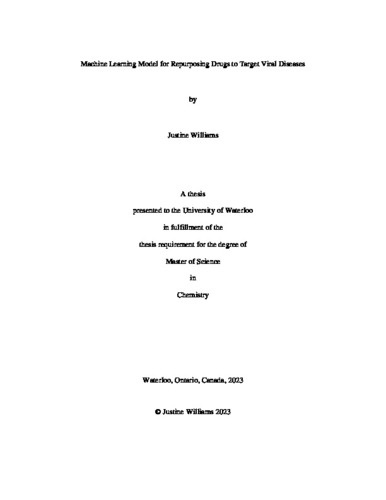| dc.contributor.author | Williams, Justine | |
| dc.date.accessioned | 2023-01-26 14:35:19 (GMT) | |
| dc.date.available | 2023-01-26 14:35:19 (GMT) | |
| dc.date.issued | 2023-01-26 | |
| dc.date.submitted | 2023-01-24 | |
| dc.identifier.uri | http://hdl.handle.net/10012/19123 | |
| dc.description.abstract | With recent events, such as the Covid-19 pandemic, it is increasingly important to develop strategies to combat viral diseases. Due to technological advancements, computer-aided drug design and machine learning (ML)-based hit identification strategies have gained popularity. Applying these techniques to identify novel scaffolds and/or repurpose existing therapeutics for viral diseases is a promising approach. As an avenue to improve existing classification models for antiviral applications, this thesis aimed to make improvements to non-binding data selection within these models. We created a classification model using molecular fingerprints to assess the performance of machine learning predictions when the model is trained using randomly selected and rationally selected non-binding datasets. Our analyses revealed that machine learning predictions can be improved using a rational selection approach. We further used this approach and trained three machine learning models based on XGBoost, Random Forest, and Support Vector Machine to predict potential inhibitors for the SARS-CoV2 main protease (Mpro) enzyme. Probability-ranked hits from the combined model were further analyzed using classical structure-based methods. The binding modes and affinities of the hits were identified using AutoDock Vina, and molecular dynamics simulations-enabled MM-GBSA calculations. The top hits identified from this multi-step screening approach revealed potential candidates that show improved affinity and stability than existing non-covalent Mpro inhibitors. Thus, our approach and the model could be useful for screening large ligand libraries. | en |
| dc.language.iso | en | en |
| dc.publisher | University of Waterloo | en |
| dc.subject | Chemistry | en |
| dc.subject | Molecular Docking | en |
| dc.subject | Molecular Dynamics | en |
| dc.subject | Drug Discovery | en |
| dc.title | Machine Learning Model for Repurposing Drugs to Target Viral Diseases | en |
| dc.type | Master Thesis | en |
| dc.pending | false | |
| uws-etd.degree.department | Chemistry | en |
| uws-etd.degree.discipline | Chemistry | en |
| uws-etd.degree.grantor | University of Waterloo | en |
| uws-etd.degree | Master of Science | en |
| uws-etd.embargo.terms | 0 | en |
| uws.contributor.advisor | Kalyaanamoorthy, Subha | |
| uws.contributor.affiliation1 | Faculty of Science | en |
| uws.published.city | Waterloo | en |
| uws.published.country | Canada | en |
| uws.published.province | Ontario | en |
| uws.typeOfResource | Text | en |
| uws.peerReviewStatus | Unreviewed | en |
| uws.scholarLevel | Graduate | en |

